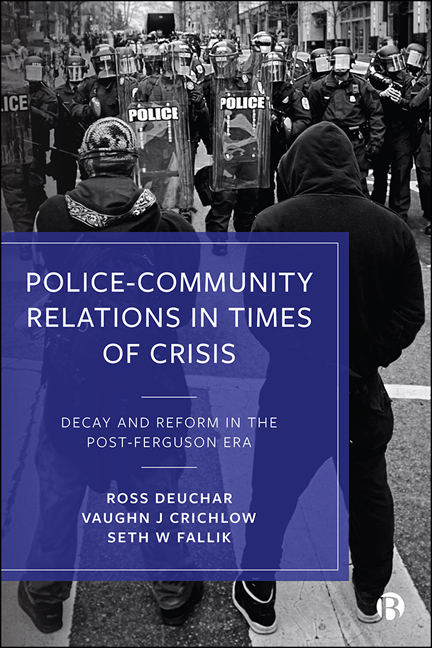Foreword
Published online by Cambridge University Press: 21 December 2021
Summary
The rule of law is the foundation of Western democracy. It is built on the mutual obligation between citizens and their government. Citizens agree to abide by the laws of their jurisdiction. Explicit in that agreement is the acknowledgment that they are subject to the laws and enforcement of those laws. In return, they get protection from the government. However, agents of the government must act in accordance with rules (procedural law) that govern their conduct. The principle of mutual obligation implies that formal social control will be delivered within the bounds of legally defined behavior by government agents. When the relationship created by that mutual obligation breaks down, you get “Ferguson.”
The decay in relationships between citizens and their government (the most visible and active agents of which are the police) began long ago in the United States. A plausible argument can be made that minorities’ first encounters with police in the US took place when the slave patrols enforced the interests of wealthy white landowners without regard to limits or principles of mutual obligation. The history of relationships between communities and individuals of color and the police has been largely a story of negative outcomes that stemmed from police practices that broke the covenant between police and policed.
But why Ferguson? In many regards this suburb of St Louis with just over 20,000 people seems an unlikely “ground zero” in the battle for police accountability. Why not a bigger city? Why not a jurisdiction with more media attention? And yet, Ferguson became a symbol for individuals aggrieved by their treatment by the police. Racial profiling in the execution of traffic laws, stop and talk/frisk, traffic fines, and “failure to appear” charges is widespread in the application of the law to minority citizens in the US. The shooting death of Michael Brown sparked outrage not just for that single event but for the countless events that preceded it in communities across the country, including those in the St Louis area. The disorder and violence that erupted in Ferguson gave a voice to everyone who had a problem with the police.
- Type
- Chapter
- Information
- Police-Community Relations in Times of CrisisDecay and Reform in the Post-Ferguson Era, pp. vi - viiiPublisher: Bristol University PressPrint publication year: 2021

